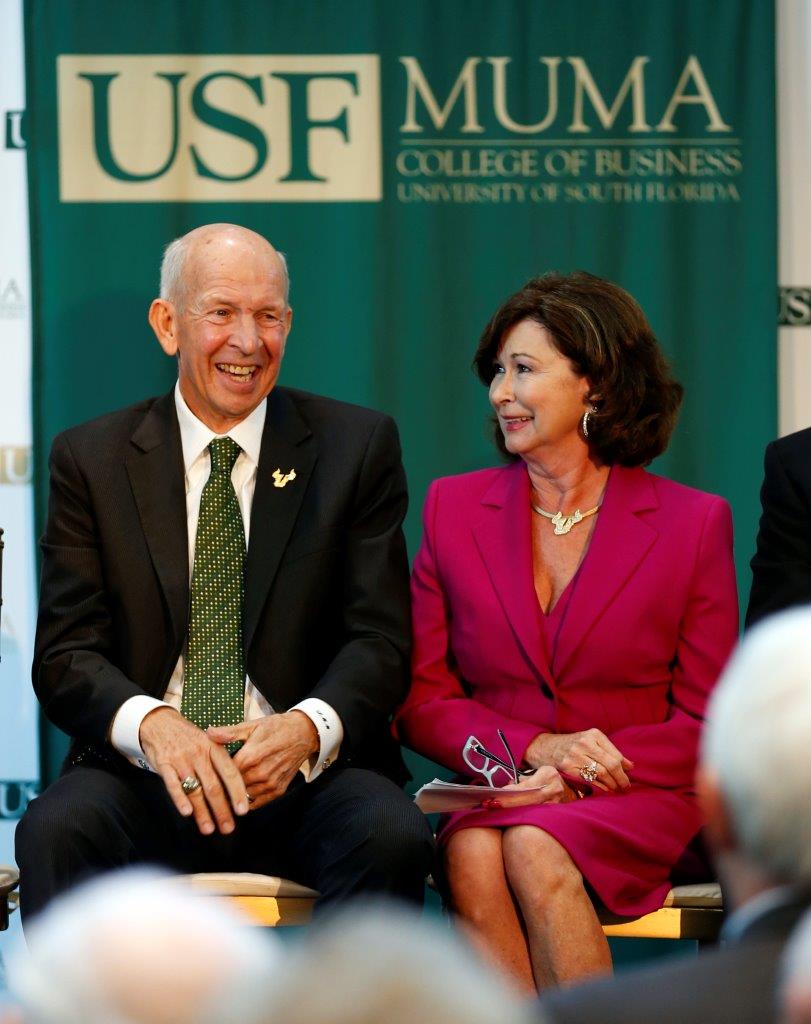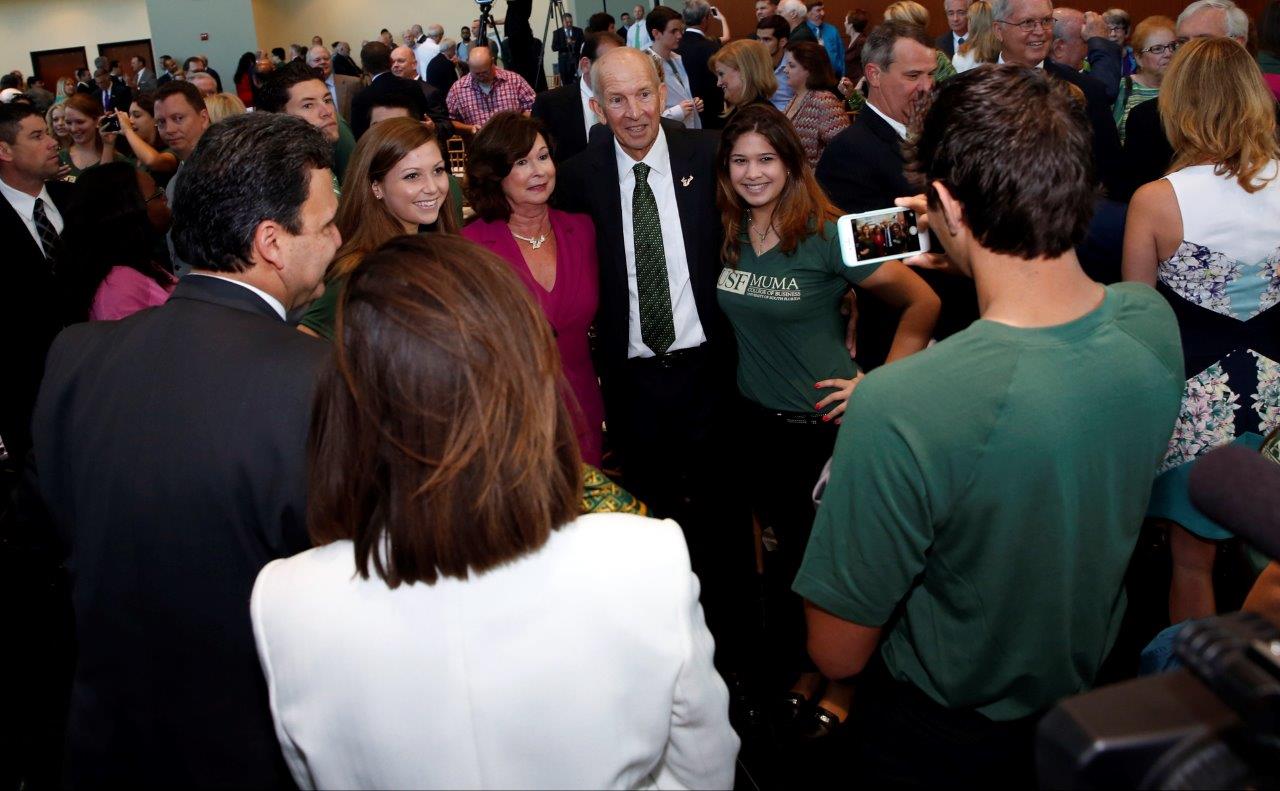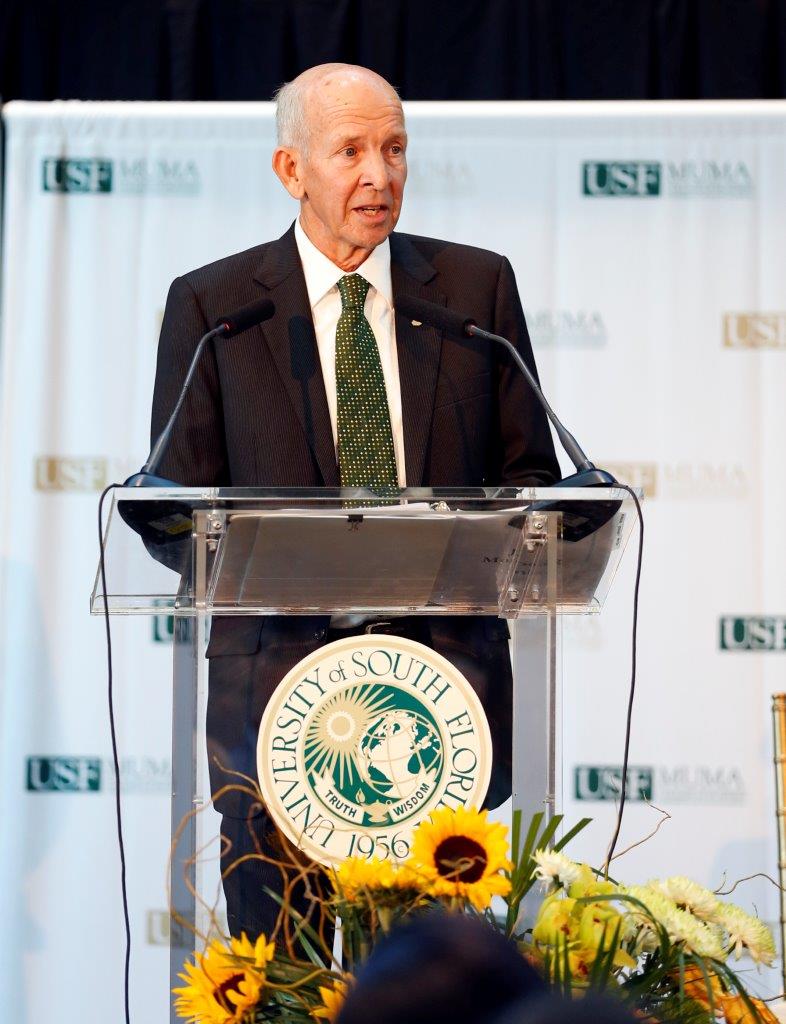Features
Photos by Matt May Photography
Starting a company from the ground up gave Les Muma the opportunity to create the organizational culture he wanted – a culture built around sound business ethics.
Student leaders and young professionals have much to learn from Brother Les Muma’s career experience. A good leader is visionary, he says, and he doesn’t shy away from reinventing himself or the company when necessary. “The willingness to continually reinvent yourself is especially important for technology companies, but it’s true for any organization,” he says. In addition to the ability to see what’s around the corner, Muma says excellent leaders have the ability to build teams who buy into an organization’s core purpose.
Focusing on people is a major theme that underscores every organization and company Muma has been involved with. The company he founded, Fiserv, grew from nothing to a $4 billion company thanks in large part to investing heavily in a sound and thorough hiring process. But it’s not enough to merely hire the right people, he cautions. You have to make sure the right people are placed in the position where they are most likely to succeed, and you have to take care of them all along. “People have to have skin in the game – they have to have some kind of ownership in the company. Fiserv was generous with handing out stock options, not only to management but all the way down through.” Muma credits this approach with helping to facilitate the company’s impressive growth since its inception.
Muma looks for employees who care deeply about the company’s purpose, but he also cautions against the cult of personality taking over. “So often we see an organization struggle after a strong leader retires. The reason that leader has trouble letting go is because the company has become him, and he has become the company. They can’t function without him.”
While he’s learned a great deal from the journey that comes from growing a successful company, Muma can recall things he wishes he had known at the outset. “I could have known a lot more about the stock market, about investing, about capital raising, before I got in because I had to scramble to learn that as we were growing.” From the beginning Muma and his business partners learned to run a company one step at a time. They expected the company to grow, but to build a company with a $10 billion market cap wasn’t even considered, he says.
Building a Strong Company Culture
Starting a company from the ground up gave Brother Muma the opportunity to create the organizational culture he wanted. “When we started Fiserv there were 12 employees in Tampa and 28 in Milwaukee. When we merged the two companies together we were careful to maintain our culture as a big company that operated like a family-run organization. That’s how we built the company.”

Les Muma and his wife, Pam, at the University of South Florida’s Muma College of Business dedication ceremony.
“You do this by demonstrating your culture through your actions,” he continues. “You have to show them what your culture looks like.”
Another tenet of Muma’s organizational culture is an unequivocal commitment to sound ethics. “If you run a company that cuts corners with ethics then eventually it’s going to catch up to you. You just can’t operate that way,” he says.
Muma knows firsthand how prevalent the temptation can be. Fiserv has conducted substantial business in foreign countries where bribes and kickbacks are often considered an accepted part of doing business. “We lost some business by not agreeing to those terms,” he recalls. “I’d have to call people in my office and say, ‘Yeah, you’re not going to get that commission. We’re not going to conduct business like that.’”
Muma’s experience as a founder and CEO hasn’t been without setbacks. He says that failures in the tech industry tend to surround ill-fated acquisitions or implementing new software before it was ready. “We had some of both,” he says, but each one was followed by an in-depth review of everything that went right or wrong. “Our focus is on not making the same mistakes twice.” He’s never fired anyone for making a mistake – only for making the same mistake multiple times.
Hiring the Right People
After spending 20+ years with involvement in the hiring of new employees, Muma is in a good position to identify what qualities are attractive to hiring managers. First and foremost, he urges recent college graduates to find an industry that they love. “Don’t get yourself in a position where you hate going to work,” he says. Muma also advises college students and young graduates to be well-rounded. “I would much rather hire a B-student who held leadership positions in his fraternity, and has played intramural sports, than a straight-A student who is only book smart. Of course a well-rounded, straight A student would be the best, but they are rare. Overall, a can-do attitude with a diverse experience in leadership is the best predictor of how successful a new employee will be.”
At a minimum, Muma expects all employees – particularly those trying to make a strong first impression – to commit themselves to good old-fashioned hard work. But he also cautions those just starting out to temper their expectations of how quickly they’ll reach the top. “You have to work your way to the top of a company,” he says. “So many of today’s youth get hired and expect to rise to the top very rapidly.”
When hiring, Muma also looks for good communicators – both written and oral. “The written communication is starting to be a lost art with kids today.”

Les and his wife, Pam, pose for photos with USF students.
But the most important trait of all? Muma says it’s having a positive, winning attitude. “That’s a trait that was part of Fiserv’s culture. If you as a leader or you as an employee have a defeatist attitude, that’s contagious. If you as a leader or employee have a positive attitude, that’s also contagious. And that’s good contagious. So that’s one thing I always look for.”
Muma and his wife, Pam, have been incredibly generous with their success. While they’ve supported an array of organizations and causes, their focus has been on kids and education especially for kids who have been less fortunate. These kids will soon inherit our communities and institutions, he reasons, and we need to make sure they are prepared to lead effectively and ethically.
Muma’s degree was in business with a focus on theoretical mathematics, which he credits with preparing him to launch a successful business career and ultimately become a CEO. “I felt I owed something to the business school. I learned an awful lot there in accounting and economics and business management while I was playing with theoretical mathematics.”
There was one other factor that drove Muma and Pam to make this transformational gift to the USF business school, and it goes back to having the right leaders in the right positions. The USF business school had recently hired a new dean, Moez Limayem, with unique leadership traits that caught Muma’s attention (Muma was on the search committee). “Coming from Tunisia, he has the international experience, which I think is important in today’s business world. He’s taught internationally, he has climbed up the ladder, and he has fire in the belly and a strong can-do attitude. He’s also got a vision of where this business school is going.”
Building a Community that Values Achievement
Muma and Pam had talked before about leaving a transformational gift, and the hiring of Dean Limayem was what pushed them over the top towards making a legacy-type gift. “We didn’t want to commit this money without a 3 to 5-year plan and Moez clearly has one.” Ever since Muma’s lead gift was announced the momentum has only increased, with new donors stepping up to join the campaign. People want to be part of a winning team, it turns out, and the Muma’s gift was just the momentum they needed. The Muma gift will go towards non-capital needs like scholarships and endowed professorships and towards programs that are directed towards student success and student employment upon graduation.
“People don’t achieve success in a vacuum. Success results from building and operating within a community that facilitates achievement. So that’s why we have such a firm belief in supporting the communities that helped us get where we are today.”
“The foundation we got from our education at University of South Florida helped us build our career and our lives.”
Muma’s support of his alma mater is only one part of his larger commitment to improving the organizations and communities that helped him along the way. “I think all of us, especially as Americans, have a moral obligation to give back. I don’t care if you give back time or talent or treasure, or all three, or two of them. I don’t care whether your treasure is a $1,000 gift or a $10 million gift – we all have an obligation to do what we can.”
A Fabric Woven from Sound Ethics
Muma has also donated his time to serving Junior Achievement (JA), an organization that helps students develop the skills they’ll need to find meaningful careers after school. One of his primary goals with JA has been to change how people think about “CEO” as a pejorative. “Back before the economic downturn we had all these companies like Enron and Arthur Anderson get in trouble for a wide variety of unethical behavior. That tended to make everyone, including young people, think CEOs were bandits – they associate ‘wealth’ these people created with ‘bad behavior.’”
Muma scheduled a meeting with the local JA leader to propose a program that would get CEOs in front of young kids to talk about ethics in high schools. “It was amazing – these kids became wide-eyed when they realized that most of the companies in the world do operate ethicallly. It’s part of the business world – if you’re not ethical you will not be successful in the long run, that was the core message we wanted to deliver.”
Muma has similar advice tailored for his fellow Sigma Nu brothers. “We have to make ethics an obvious part of the fabric of a Sigma Nu. Morality and ethics. Do things the right way. You don’t cheat to get ahead. You don’t discredit someone to make yourself look better. All the things that we know are the right way to run your life.”
Muma’s penchant for entrepreneurialism can be traced all the way back to a time before Sigma Nu began at USF. Muma matriculated at USF in 1962. At the time there were only four or five fraternities on campus, all local groups with no national affiliation. “A few of my friends and I looked around during recruitment and didn’t like what we saw,” Muma recalls. “’Why don’t we start our own fraternity,’ we asked ourselves.”

Muma and the rest of the group went through the proper channels at the student activities office, completed the paperwork, and local fraternity Kratos was born. The group became a thriving local chapter that excelled in athletics and community service – a profile that continued through affiliation with Sigma Nu.
This experience would prove to be formative for Muma’s budding business career. “When you build anything – whether a fraternity or a company — you attract people like you. Our brothers had the same beliefs we had. If prospective members didn’t share our values then we weren’t interested, and they weren’t attracted to us either.”
Muma had graduated by the time Cratos affiliated with a national organization, eventually becoming Sigma Nu’s Theta Alpha Chapter in 1967. Though he wasn’t involved with the chapter gaining national affiliation, he applauded the move and later returned to campus to officially become a Sigma Nu. Ever since then he has tried to return to campus for recruitment each year to participate in Theta Alpha’s Traditions Night in which alumni brothers return to talk about their Sigma Nu experience.
Muma has a key message he delivers to the chapter and potential members each year when he visits for formal recruitment: “Be the guy who tries the hardest. Keep a positive attitude. If you can’t do it right and ethically then don’t do it at all. Be a Sigma Nu.”
“The values of Sigma Nu are the core values I’ve always believed in.”